Yes, extra virgin olive oil does extra virgin olive oil solidify in the refrigerator. This is a normal reaction due to its high content of monounsaturated fats and natural waxes. The mixture of different types of fats causes the oil to begin to solidify at lower temperatures. Don’t worry; this doesn’t affect the oil’s quality or nutritional value. In this article, we’ll explain why this happens and what it means for your olive oil.
Key Takeaways
-
Extra virgin olive oil can solidify in the refrigerator due to the presence of saturated fats and natural waxes, but this does not affect its quality or nutritional value.
-
The popular ‘fridge test’ is a myth; it cannot accurately determine the purity of EVOO, as all fats may solidify at low temperatures.
-
Proper storage of EVOO is essential; keep it in a cool, dark place, and understand that cloudiness is a natural response and not a sign of spoilage. Understanding these temperature effects is important for food storage and quality assessment of olive oil, especially in relation to common food refrigeration practices.
Understanding Extra Virgin Olive Oil Solidification
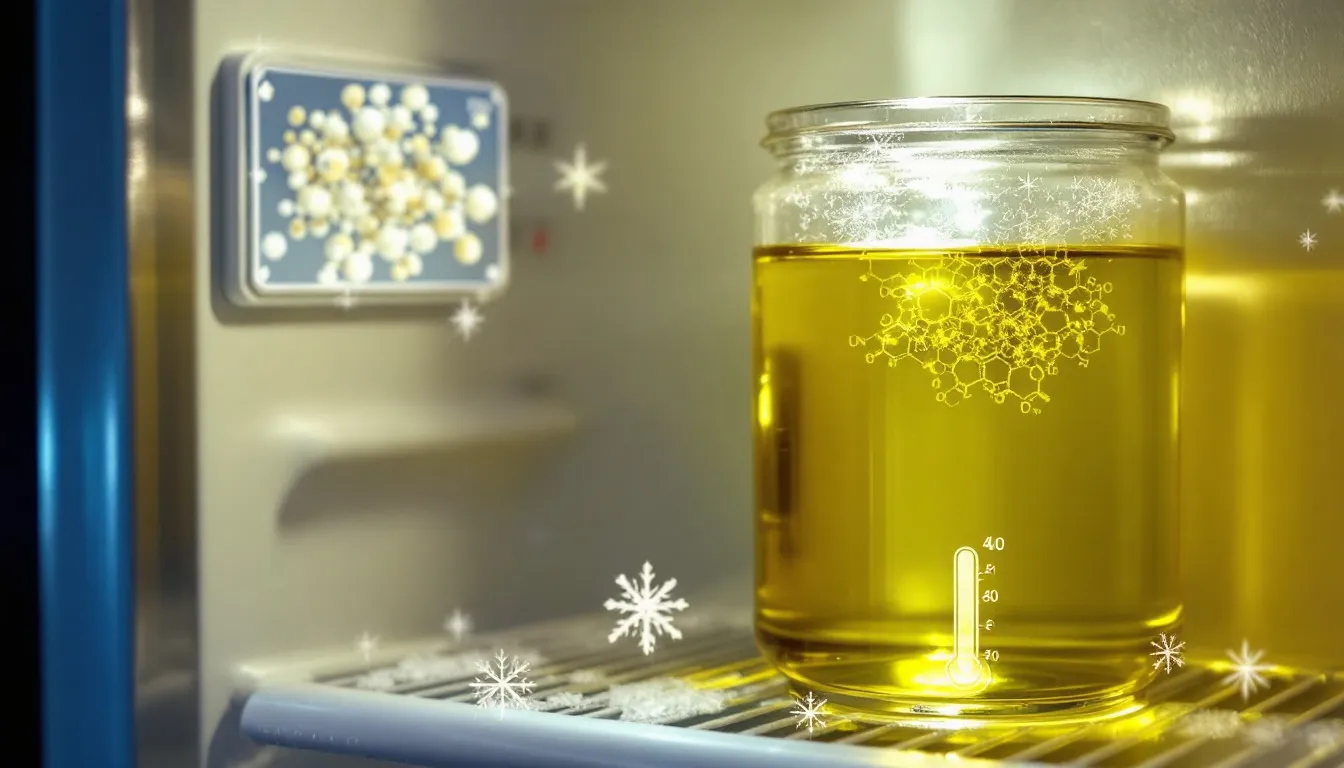
One of the most intriguing characteristics of extra virgin olive oil is its ability to become cloudy or even solidify at lower temperatures. This is due to its high content of monounsaturated fats and natural waxes, which tend to crystallize when exposed to cold environments. The cloudiness you observe is simply fat crystallization, not a sign of spoilage. Think of it as olive oil’s way of bundling up for the winter.
The solidification process of EVOO varies with its chemical composition. Different batches of EVOO can crystallize or solidify at varying temperatures, influenced significantly by the presence of saturated fatty acids and natural waxes. The olive variety also plays a significant role in the solidification process. It’s a fascinating dance of chemistry where each bottle of EVOO tells a unique story based on its origins and composition.
Understanding that the solidification of olive oil in the fridge doesn’t affect its quality is key. Your EVOO hasn’t lost its nutritional value or flavor; it’s merely reacting to the cold chill. The presence of natural waxes on the fruit's skin influences the oil's behavior in cold temperatures. Knowing this can put your mind at ease the next time you notice your oil turning cloudy or solidifying.
The Science Behind Solidification
Olive oil solidifies due to its chemical makeup. The main components of olive oil are triacylglycerols, which consist of three fatty acid molecules bonded to a glycerol molecule. Among these fatty acids, oleic acid is the most prevalent, but linoleic, palmitic, and stearic acids also play crucial roles. These chemical compounds, particularly the saturated fatty acids and natural fatty acids, significantly influence the solidification temperature of olive oil solidify EVOO.
Refined oils can solidify at different temperatures compared to extra virgin olive oil, which can mislead consumers about the purity of the oil.
Factors such as the variety of olive, the time of harvest, and the processing methods used all contribute to the unique solidification characteristics of each batch of EVOO. For instance, oils produce from early-harvest olives might solidify at a different rate compared to those harvested later. The region and growing conditions also impact the fatty acid profile, adding another layer to this intricate process.
When temperatures drop, the saturated fatty acids like palmitic and stearic acids crystallize first, leading the oil to shift from a liquid state to a solid form. This transition will eventually solidify as a natural response to cold and varies depending on the oil’s composition. So, next time you see your EVOO solidifying, you’ll know it’s just science at work.
Debunking the Refrigerator Test Myth
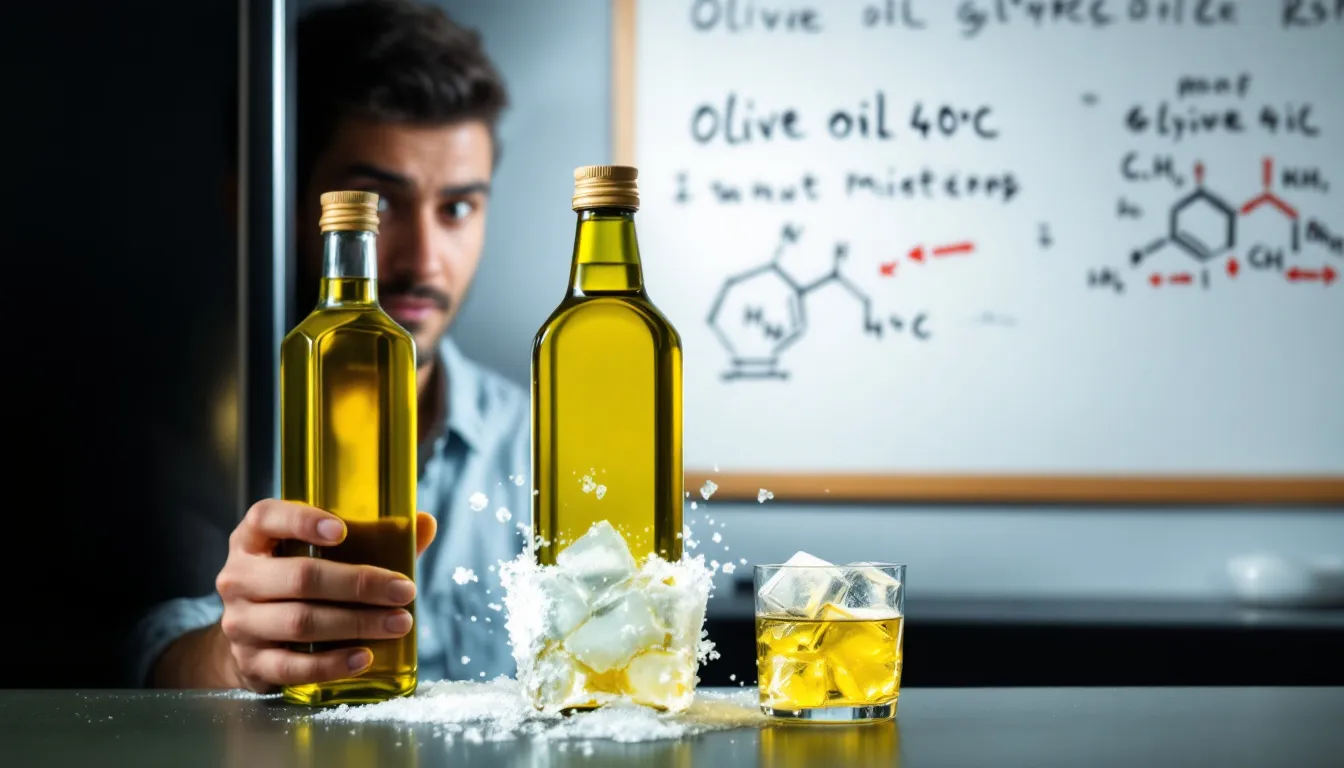
One of the most persistent myths about extra virgin olive oil is the so-called “fridge test.” This test suggests that you can determine the purity of EVOO by placing it in the refrigerator and observing if it solidifies. However, this notion is completely false. All fats, including adulterated oils, will solidify at low temperatures, making this test unreliable. Dan Flynn, Executive Director of the UC Davis Olive Center, critiques this test, explaining that various olive oil varieties may not solidify in cold temperatures, which undermines its validity as an indicator of EVOO authenticity.
Authenticity and quality of olive oil are determined through complex analytical methods, not simple home tests. For instance, standards such as free acidity and peroxide value are used to assess quality, while polyphenol lab tests are necessary to confirm health benefits. The fridge test, therefore, fails to provide any meaningful information about the oil’s pure quality or tested quality. Olive oils mixed with other oils can still solidify in cold temperatures, leading consumers to falsely interpret these results as indicative of purity.
The real way to ensure your EVOO is of high quality is to trust reputable producers and look for certifications. Remember, the refrigerator test is a myth, and the true measure of EVOO’s quality lies in its chemical analysis.
Reversing Solidification
If you find your EVOO solidified in the fridge, don’t worry. Letting it sit at room temperature for a few hours will restore it to its liquid state. If you’re in a hurry, you can place the bottle in warm water, but avoid boiling temperatures to prevent any damage to the oil’s delicate compounds.
It’s reassuring to know that the health benefits of extra virgin olive oil are preserved even when the oil is cold. Its nutritional properties remain unaffected by the solidification process. So, whether you’re cooking or using it as a salad dressing, your EVOO retains its beneficial qualities.
Sometimes, even after warming, the high quality oil may remain cloudy. This could be due to an insufficient room temperature or the presence of natural particles and antioxidants, which are actually signs of a quality product. Don’t be quick to judge cloudiness as a flaw; it might just be a testament to the oil’s authenticity and richness in nutrients.
Storing Extra Virgin Olive Oil Properly
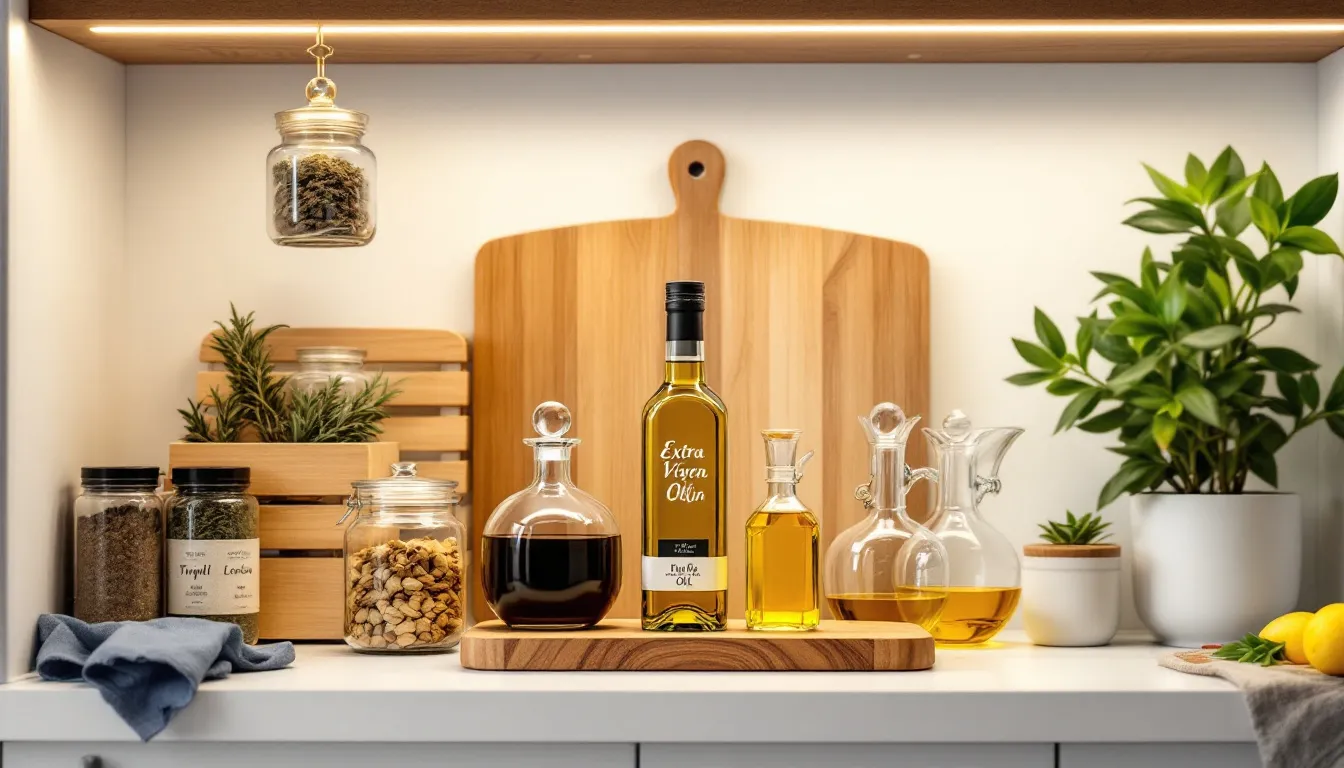
Proper storage of extra virgin olive oil is crucial to maintaining its quality. The recommended storage temperature for EVOO is around 57°F, ideally in a dark, cool location away from heat sources. Exposure to direct sunlight and improper temperature fluctuations can lead to rapid quality degradation and cause the oil to solidify.
Avoid decanting the oil unless using a completely opaque and airtight cruet to preserve its freshness. If you don’t have a cooler area available, consider refrigerating the oil, but remember to let it return to room temperature before use. Putting olive oil in the refrigerator can extend its shelf life, but it may cause the oil to become cloudy and solidify, which does not affect its quality.
Proper storage practices are vital in protecting the oil’s flavor and nutritional value.
High-quality EVOO should be stored in dark bottles to protect it from light, which can accelerate rancidity. Keeping your oil in a cool, dark place ensures it stays fresh and maintains its health benefits. Remember, the way you store your olive oil can significantly impact its shelf life and overall quality.
Comparing Oils: Extra Virgin Olive Oil vs. Other Oils
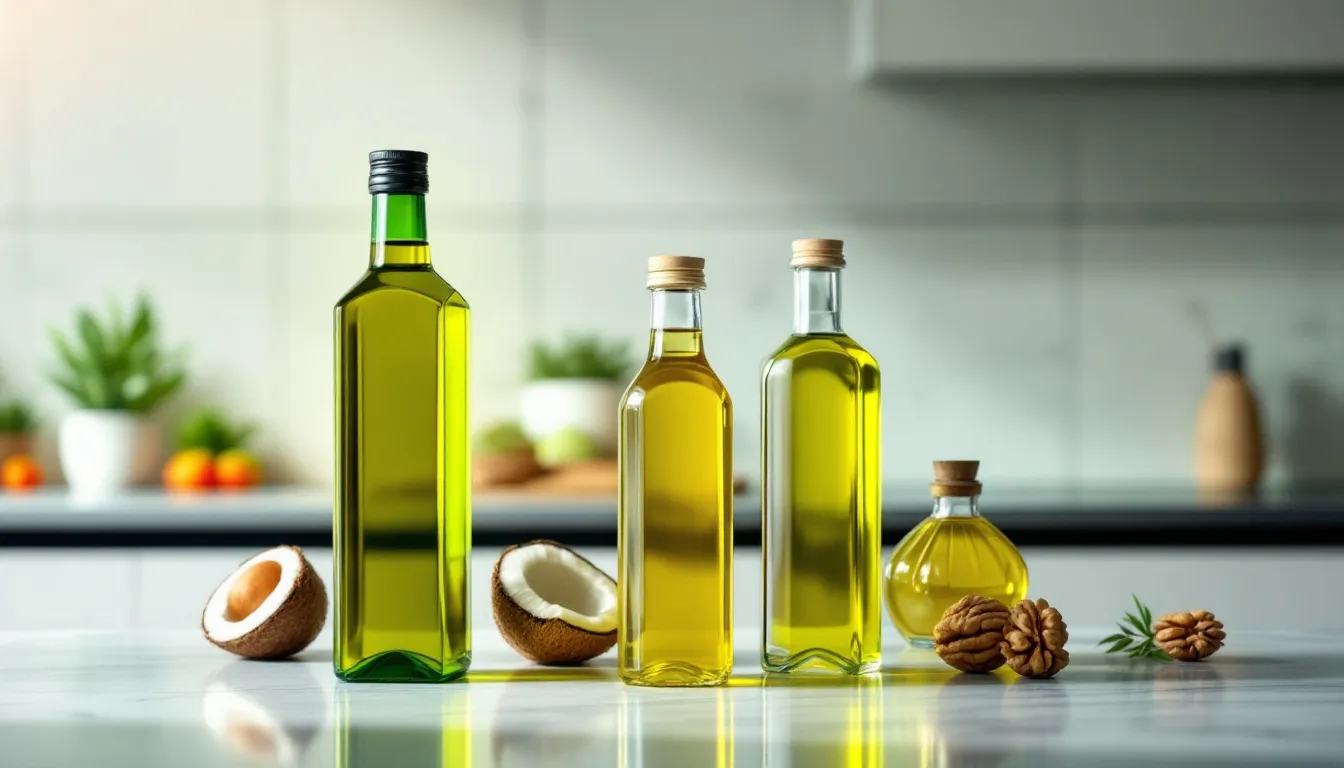
Almost all oils, including canola and sunflower oil, can become cloudy and solidify at cold temperatures. However, extra virgin olive oil typically solidifies below 39.2°F (4°C), whereas canola oil tends to remain liquid under most refrigerator temperatures. Dr. Oz's recommendations regarding the refrigeration of EVOO have led to misunderstandings; solidification in the fridge does not reliably indicate the authenticity or quality of EVOO, as various factors such as olive variety and temperature impact results.
The solidification point of olive oil is influenced by its high content of natural waxes and monounsaturated fats. In contrast, oils like canola contain a mix of different fats that can also lead to solidification but at different temperatures. Sunflower oil’s solidification point can vary greatly based on its specific fatty acid composition. The diverse flavors of extra virgin olive oil are influenced by various factors like the region, season, and type of olive, contributing to its unique profiles and making it distinct and enjoyable in culinary applications.
Recognizing Quality: Cloudiness as a Good Sign?
Cloudiness in olive oil is a natural occurrence and should not be mistaken for a sign of spoilage. These solid particles will dissolve back into the oil upon warming. However, cloudiness is not a reliable indicator of quality. Some high-quality extra virgin olive oils may remain clear, while others can become cloudy.
Color variations in olive oil, from green to golden yellow, do not correlate with quality either. The differences in color are due to factors like the type of olives used and growing conditions, but they are not evaluated in competitions. So, whether your EVOO is clear or cloudy, green or yellow, its quality is determined by other factors.
In conclusion, while cloudiness can sometimes be a sign of natural particles and antioxidants, it is not a definitive measure of quality. It’s important to focus on the oil’s taste, aroma, and chemical composition to determine its true value.
Common Myths About Olive Oils
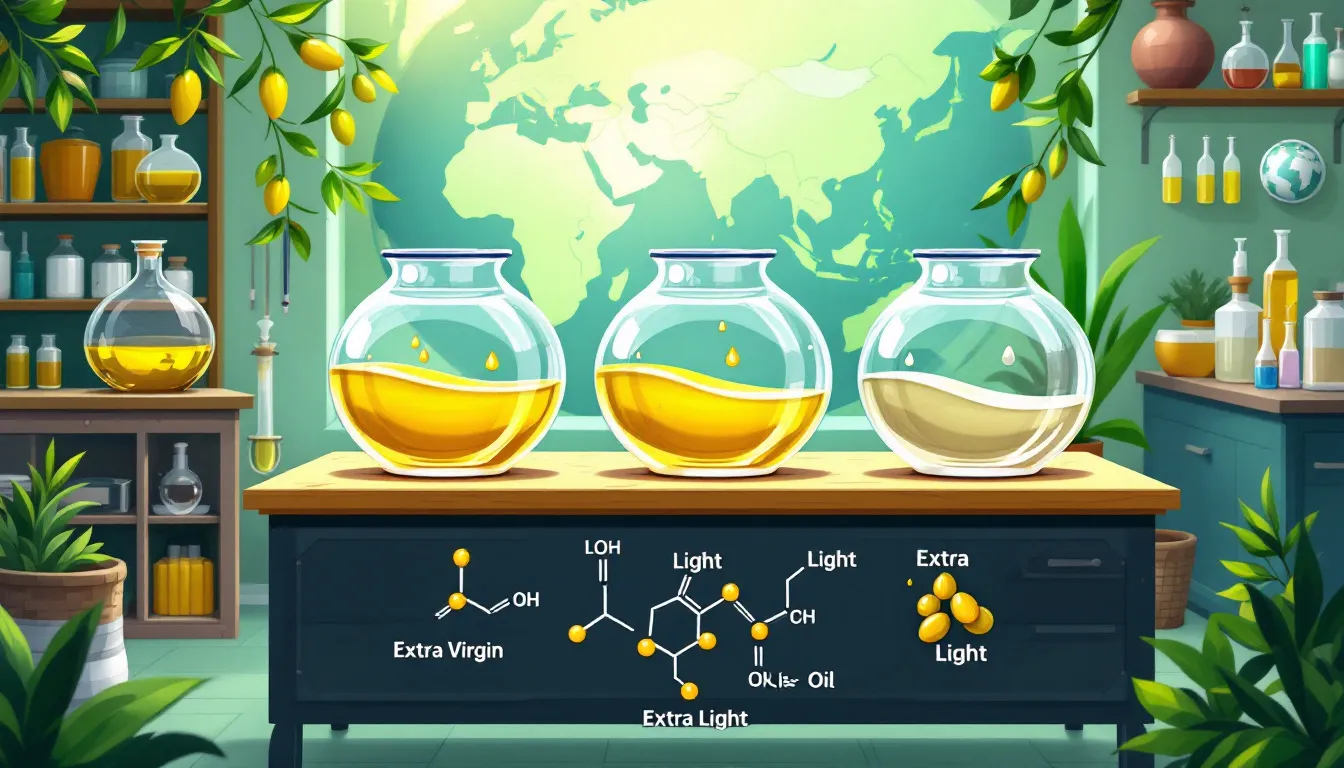
Many consumers believe that only lower quality oils solidify at cold temperatures. However, this is a myth. High-quality extra virgin olive oil can also solidify below 50°F at a lower temperature. The solidification is influenced by the oil’s chemical makeup, particularly the types of fatty acids present.
Cloudiness and solidification can occur in both high and low-quality oils, making them unreliable indicators of overall quality. The presence of monounsaturated fats, polyunsaturated fats, and natural waxes causes this behavior, regardless of the oil’s grade. It’s essential to understand these nuances to appreciate the true quality of your olive oil.
Regular olive oil, compared to extra virgin olive oil, is more resilient to varying storage conditions. Factors such as temperature, exposure to light, and air can affect the quality and lifespan of olive oil. Misconceptions about olive oil solidification in the refrigerator are prevalent, particularly regarding its authenticity.
By debunking these common olive oil myths, we can better appreciate the complexity and value of extra virgin olive oil. It’s not just about appearance; it’s about the rich history, careful production, and meticulous storage that make EVOO a culinary treasure.
Summary
In summary, extra virgin olive oil solidifies in the refrigerator due to its unique chemical composition and the presence of monounsaturated fats and natural waxes. This solidification is a natural process and does not affect the oil’s quality or health benefits. The refrigerator test is a myth, and the true measure of EVOO’s quality lies in its chemical analysis.
Proper storage is crucial to maintaining the quality and flavor of your EVOO. By understanding these factors, we can ensure that our olive oil remains a valuable and delicious part of our culinary repertoire. Keep your EVOO in a cool, dark place, and enjoy it in all its forms, whether liquid or solid.
Disclaimer : These statements have not been evaluated by the Food and Drug Administration. This product is not intended to diagnose, treat, cure, or prevent any disease. Individual results may vary. Please consult a healthcare professional before making changes to your diet or wellness routine. These findings come from independent research and do not guarantee the same results with our product.
Frequently Asked Questions
Why does my extra virgin olive oil solidify in the refrigerator?
Your extra virgin olive oil solidifies in the refrigerator because its healthy fats and natural waxes crystallize when it gets too cold. Don’t worry; it’ll return to liquid at room temperature!
Does the solidification of olive oil indicate low quality?
Solidification of olive oil doesn't mean it's low quality; in fact, high-quality extra virgin olive oil can also solidify because of its natural composition. So, don't be concerned when you see it solidifying!
How can I restore solidified olive oil to its liquid state?
You can easily restore solidified olive oil by letting it sit at room temperature for a few hours or by placing the bottle in warm water—just steer clear of boiling temperatures!
Is the refrigerator test a reliable method to determine olive oil purity?
The refrigerator test isn't a reliable way to check olive oil purity; that's just a myth. For accurate assessments, we need more sophisticated analytical methods.
How should I store extra virgin olive oil to maintain its quality?
To keep your extra virgin olive oil fresh, store it in a dark, cool place around 57°F, away from sunlight and heat. Opt for opaque, airtight containers to maintain its quality.

